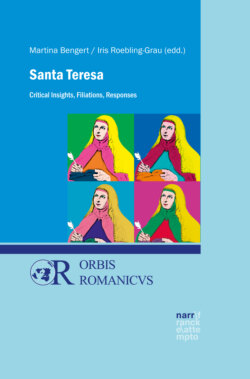Читать книгу Santa Teresa - Группа авторов - Страница 29
На сайте Литреса книга снята с продажи.
1. Formulae of empowerment: the ‘I’ of authority and the ‘I’ of submission
ОглавлениеThe ‘I’ of Teresa is a polyphonic ‘I’, deployed in her discourse in all of its unfolding personality and at times antithetical to itself, revealing a rhetorical mise en scène in her work. In her appeal to both the ‘I’ of authority and the ‘I’ of modesty, Teresa’s stance is in that broad strategy of the alibi that with an explicitly apologetic intentionality defines her discourse: the pro vita sua apology.
The ‘I’ of authority is present in her appeals to experience. On one occasion, Teresa claims “Esto visto por experiencia” (“This seen through experience”), ironically adding in the very next line: “que es otro negocio que sólo pensarlo” (“which is entirely different from merely thinking about it”) (CV 6,3). That is to say that for the Saint, the true starting point is the pathic or the lived, and not the speculative – hence the abundant use of the verb ‘estar’ in her writings.1 What really matters for Teresa is an existentialism, supported in concrete and local realities, that underpins her mystical experience: “No diré cosa que en mí, o por verla en otras, no la tenga por experiencia […].” (“I shall say nothing about what I have not experienced myself or seen in others […]”) (CV prolog, 3).
With Saint Teresa, the ‘I’ of authority is inseparable from the ‘I’ of modesty which is rhetorically deployed in appeals to false humility. Submission and silence are the other face of Teresa’s discourse: she (only apparently) seems to submit to the definitive judgment of her authoritative readers and censors. Her status as a woman in the misogynistic society of the sixteenth century is the determining factor in this regard:
Yo, como me vi mujer y ruin e imposibilitada de aprovechar en lo que yo quisiera en el servicio del Señor […].
I realized I was a woman and wretched and incapable of doing any of the useful things I desired to do in the service of the Lord […]. (CV 1,2).
Teresa never tires of reminding us of her many sins and her wretched life. But she never says precisely what these sins are. She only refers to one, which seems to be the result of reading books of chivalry, as when she writes in her Vida: “Comencé a tener galas y desear contentar en parecer bien” (“I began to dress in finery and to desire to please and look pretty”) (V 2,2). However, she curiously undercuts this immediately by asserting two lines below: “No tenía mala intención” (“I meant no harm by it”) (V 2,2). As Ricardo Senabre avers, “The Saint poses as a terrible sinner, but is only specific about one sin, which was a fashionable hobby horse of preachers and moralists of the time (Vives, Venegas, Guevara, Monzón ). Everybody read novels about heroic and chivalrous knights.”2
These phrases, traditionally explained as clichéd false modesty, are in fact just like the appeals to personal authority, true formulae of empowerment.3 Teresa is faced with a misogynistic society, knowing that she is ‘weak’ (excluded and marginalized), but this is a sociological weakness more than an anthropological one.4 It is only in taking on this ‘weakness’ that the mystic is in a position to transcend it, to open herself up to an ecstatic and liberating force of empowerment. In this way, paradoxically, acknowledging and assuming a ‘weakness’ (imposed in this case by society), Teresa finds the leverage or springboard to grasp power. What we have here are in fact tactical moves that enable her to get away with what she wants.
This is an example of how the interpretation of the Teresian texts has evolved, especially the so-called ‘formulae of modesty’: in 1970, the poet and literary critic Gerardo Diego wondered why Teresa used such formulae, concluding that she did it out of “pure humility”5. In 1983, Márquez Villanueva spoke of “rhetorical strategies”6. In 1990, Alison Weber referred to the “rhetoric of femininity”7. In 2001, I explained such expressions from the pragmatic and the theory of speech acts.8 And perhaps today, up to the year 2018, we have to talk about formulae of empowerment.9 As one can see, interpretation is open to the future.
